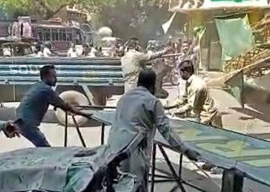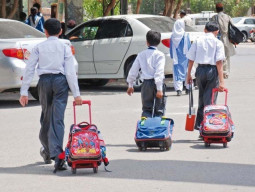
The drummer would cycle or walk through the streets, setting a rhythm of beats on his drum and urging people to get up for Sehri. Though this tradition has largely disappeared over the years, the sound of drums still echoes in the older settlements of the city.

Lyari, which has been prone to violence and turf wars, has still managed to keep intact the Ramazan fervour. The people of Lyari don't sleep until Sehri. Abdul Jalil Baloch, an activist and teacher at numerous street schools, is proud of the fact that Lyari has managed to sustain and nurture its traditions even in times of adversity. "In some areas, young boys roam the streets reciting naats while others occasionally pick up the dhol to wake up the neighbourhood. It is on a much smaller scale than in the past but the younger ones are keeping the tradition alive," he said.

The Sindhi Chawal is a favourite among the Sindhi community of Lyari. PHOTO COURTESY: WAQAS SHEIKH
Dilshar Baloch, a young photographer who goes about capturing the sights of Lyari, says he has always seen the dhol wala in Ramazan ever since he was a child. "The baba is 55 years old and has been beating his drum every Ramzan for the last 30 years," he claimed.
Read: Unleashing talent: Getting to know the ‘Humans of Lyari’
Much of the fanfare that starts in the streets of Lyari is after Taraweeh time when families have had their dinners and there are a few hours left for Sehri. The younger crowd goes out to play street cricket, football and carom board. "The routine is the same every day. We stay up till fajr prayers and sleep till mid-day. By evening, food stalls are laid out in the streets and the festivities go on till late night," says Dilshar.

The dhol wala who has been waking up Lyari for the past 30 years. PHOTO COURTESY: DILSHAR BALOCH
While the area thrives on its own culture, the food of the Baloch and Sindhi communities of Lyari are distinctive in their own way. For Sehri and Eid breakfast, Bajiya, a form of thick crusted, fried daal kababs are eaten. Lavash — large flat rotis made at the tandoor are also popular among the locals, often consumed with Bankhlik, a curry of red beans cooked in local spices.
Read: Standing ovation: Lyari wins back sports fame in Sindh Assembly
The Sindhis of Lyari also fondly talk about their Sindhi Chawal. Made out of soya and dhaniya (cumin) as the primary ingredients, the rice is brilliant green in color and is a favourite among the Sindhi community.

Bajiya — a form of thick crusted, fried daal kababs — is popular among the Baloch. PHOTO COURTESY: WAQAS SHEIKH
For women, Lyari offers Ramazan bazaars where they can shop and put up stalls. A festival of sorts, the Shah Abdul Latif hall, comes alive from the 10th of Ramazan till the sighting of the Eid moon. "Men are not allowed inside this bazaar as it has been put up for women only," says Dilshar.
Published in The Express Tribune, July 7th, 2015.
































COMMENTS
Comments are moderated and generally will be posted if they are on-topic and not abusive.
For more information, please see our Comments FAQ